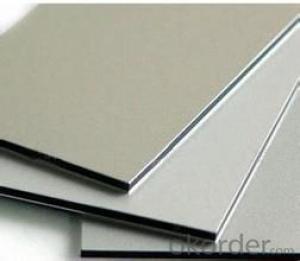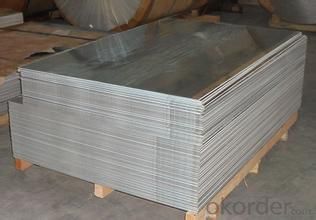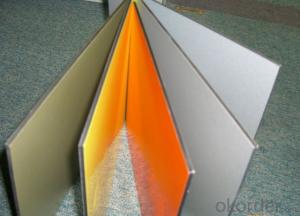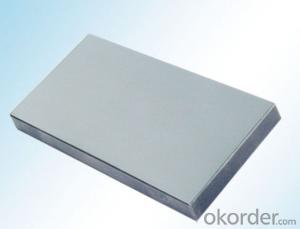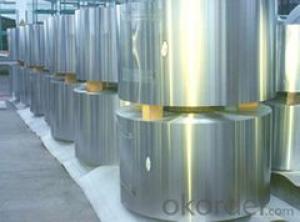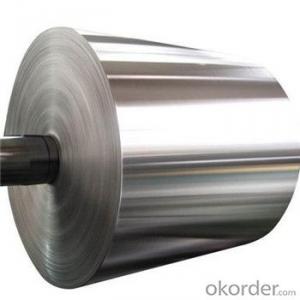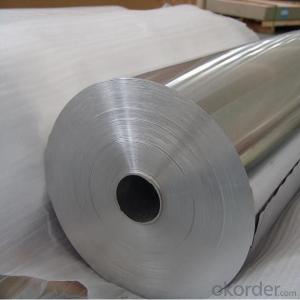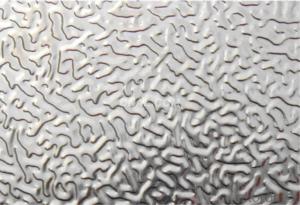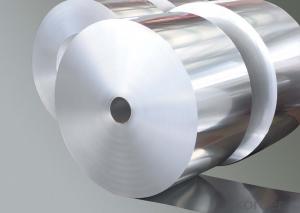Aluminum Brazing Sheet for Individual Sheets of Aluminum Foil
- Loading Port:
- China Main Port
- Payment Terms:
- TT OR LC
- Min Order Qty:
- -
- Supply Capability:
- -
OKorder Service Pledge
OKorder Financial Service
You Might Also Like
Aluminium alloys with a wide range of properties are used in engineering structures. Alloy systems are classified by a number system (ANSI) or by names indicating their main alloying constituents (DIN and ISO).
The strength and durability of aluminium alloys vary widely, not only as a result of the components of the specific alloy, but also as a result of heat treatments and manufacturing processes. A lack of knowledge of these aspects has from time to time led to improperly designed structures and gained aluminium a bad reputation.
One important structural limitation of aluminium alloys is their fatigue strength. Unlike steels, aluminium alloys have no well-defined fatigue limit, meaning that fatigue failure eventually occurs, under even very small cyclic loadings. This implies that engineers must assess these loads and design for a fixed life rather than an infinite life.
Another important property of aluminium alloys is their sensitivity to heat. Workshop procedures involving heating are complicated by the fact that aluminium, unlike steel, melts without first glowing red. Forming operations where a blow torch is used therefore require some expertise, since no visual signs reveal how close the material is to melting. Aluminium alloys, like all structural alloys, also are subject to internal stresses following heating operations such as welding and casting. The problem with aluminium alloys in this regard is their low melting point, which make them more susceptible to distortions from thermally induced stress relief. Controlled stress relief can be done during manufacturing by heat-treating the parts in an oven, followed by gradual cooling—in effect annealing the stresses.
The low melting point of aluminium alloys has not precluded their use in rocketry; even for use in constructing combustion chambers where gases can reach 3500 K. The Agena upper stage engine used a regeneratively cooled aluminium design for some parts of the nozzle, including the thermally critical throat region.
Another alloy of some value is aluminium bronze (Cu-Al alloy).
Aluminium foil acts as a total barrier to light and oxygen (which cause fats to oxidise or become rancid), odours and flavours, moistness, and germs, it is used broadly in food and pharmaceutical packaging. The purpose of aluminium is to make long-life packs (aseptic processing|aseptic packaging) for drinks and dairy goods, which allows storing without refrigeration. Aluminium foil containers and trays are used to bake pies and to pack takeaway meals, ready snacks and long life pet foods.
Aluminium foil is widely sold into the consumer market, often in rolls of 500 mm (20 in) width and several metres in length.It is used for wrapping food in order to preserve it, for example, when storing leftover food in a refrigerator (where it serves the additional purpose of preventing odour exchange), when taking sandwiches on a journey, or when selling some kinds of take-away or fast food. Tex-Mex restaurants in the United States, for example, typically provide take-away burritos wrapped in aluminium foil.
Aluminium foils thicker than 25 μm (1 mil) are impermeable to oxygen and water. Foils thinner than this become slightly permeable due to minute pinholes caused by the production process.
- Q: What is the typical machinability of aluminum sheets?
- The machinability of aluminum sheets is generally considered to be excellent. Aluminum is known for its relatively low density and softness, which makes it easier to machine compared to other metals. It has good thermal conductivity, allowing for efficient removal of heat generated during machining, and it also has a low melting point, reducing the risk of overheating. Additionally, aluminum has good chip formation characteristics, resulting in easy chip evacuation and reduced tool wear. However, the machinability of aluminum can vary depending on factors such as alloy composition, tempering, and surface finish. Overall, aluminum sheets are widely regarded as being highly machinable.
- Q: I am using Reeves Acrylic Colour Set and I plan on painting on Heavy Duty Ralphs Brand Aluminum Foil. Will the paint be able to go on the foil well? Tips? Thank you.
- i use aluminum foil to mix colors on and when it dries it DOES stick, however, it will scratch off really easy. just try experimenting. what do u need the foil for? maybe you can try the aluminum foil leaves? the flakes that you put ontop on the art instead of under it. that way you can glue it on and dont have to worry about it scratching off. foil looks beautiful on paintings :) how it turns out great
- Q: This question asks if aluminum sheets can be utilized for both exterior and interior purposes.
- <p>Yes, aluminum sheets can be used for both exterior and interior applications. They are popular for exterior use due to their durability, resistance to weather, and low maintenance requirements. For interior applications, aluminum sheets are valued for their lightweight, easy installation, and aesthetic appeal. They are commonly used in construction, automotive, and aerospace industries, among others. However, it's important to note that specific treatments or coatings may be necessary to enhance their performance in different environments.</p>
- Q: What are the different types of aluminum sheets available in the market?
- The market offers a variety of aluminum sheets, each with unique characteristics and applications. Some of the most common types are: 1. Plain Aluminum Sheet: Widely used and fundamental, this type is known for its excellent corrosion resistance and high strength-to-weight ratio. It finds applications in construction, automobile manufacturing, and aerospace industries. 2. Painted Aluminum Sheet: These sheets are coated with paint to enhance aesthetics and protect the underlying aluminum from environmental elements. They are commonly used in architecture, signage, and decorative purposes. 3. Perforated Aluminum Sheet: This type features perforations or holes throughout its surface. It is often used in architectural projects, industrial filtration systems, and ventilation applications. 4. Embossed Aluminum Sheet: These sheets have a textured or patterned surface created through embossing or rolling. They are frequently used for decorative purposes, like interior design, signage, and packaging. 5. Anodized Aluminum Sheet: Through an electrochemical process, a protective oxide layer forms on the surface of the aluminum. Anodized sheets are highly resistant to corrosion and abrasion, suitable for outdoor applications like building facades and automotive parts. 6. Tread/Diamond Plate Aluminum Sheet: This type has raised diamond or tread patterns on its surface, providing enhanced grip and traction. They are commonly used in transportation, flooring, and staircases. Furthermore, aluminum sheets are available in various thicknesses, sizes, and alloys, such as 3003, 5052, and 6061. The specific type required depends on the intended use and project requirements.
- Q: Explain the distinction between aluminum sheets based on their thickness.
- <p>Aluminum sheets with different thicknesses primarily differ in their strength, weight, and applications. Thicker sheets offer greater strength and rigidity, making them suitable for structural applications or heavy-duty uses. In contrast, thinner sheets are lighter and more flexible, ideal for applications requiring formability or where weight is a concern, such as in the automotive or aerospace industries. The choice of thickness depends on the specific requirements of the project, including load-bearing needs, durability, and aesthetic considerations.</p>
- Q: What are the different methods of surface treatment for adhesive bonding of aluminum sheet?
- There are several different methods of surface treatment for adhesive bonding of aluminum sheet. These methods can help improve the bond strength and durability of the adhesive joint. Some common methods include: 1. Mechanical Surface Treatment: This method involves roughening the aluminum surface using techniques such as sandblasting, abrasion, or wire brushing. The roughened surface creates a better mechanical interlock between the adhesive and the aluminum, increasing the bond strength. 2. Chemical Surface Treatment: Chemical treatments can be used to remove contaminants, oxidation, or corrosion from the aluminum surface. Common chemical treatments include acid etching, chromate conversion coating, or anodizing. These treatments improve the surface cleanliness and promote adhesion by creating a chemically reactive surface for the adhesive. 3. Plasma Treatment: Plasma treatment involves exposing the aluminum surface to a low-temperature plasma discharge. This process modifies the surface energy and removes contaminants, thereby enhancing the wettability and adhesion of the adhesive. 4. Primer Coating: Applying a primer coat on the aluminum surface can improve adhesion by promoting chemical bonding between the adhesive and the substrate. Primers are typically designed to promote adhesion to specific substrates and can enhance the bond strength and durability of the adhesive joint. 5. Surface Activation: Surface activation techniques, such as flame treatment or corona treatment, can be used to increase the surface energy of the aluminum sheet. These methods create free radicals on the surface, which improve the bonding characteristics of the adhesive. It's important to note that the selection of the surface treatment method depends on various factors like the specific adhesive used, the desired bond strength, the application requirements, and the condition of the aluminum surface. Therefore, it is recommended to consult adhesive manufacturers or experts to determine the most suitable surface treatment method for a specific adhesive bonding application.
- Q: on the metal activity series, aluminum sits between magnesium and zinc, and all three sit above hydrogen. Explain why aluminum typically reacts only slowly with dilute acids even though both magnesium and zinc react rapidly
- Aluminum metal reacts with oxygen in the air to form a very tightly bonded aluminum oxide on its surface which slows the attack of acids trying to make contact with the aluminum atoms below the surface.
- Q: Can aluminum sheets be painted?
- Yes, aluminum sheets can be painted. However, the process of painting aluminum sheets may require some preparation to ensure proper adhesion and durability of the paint. The most important step is to clean the surface of the aluminum sheet thoroughly to remove any dirt, grease, or corrosion. This can be done using a mild detergent and water or a specialized aluminum cleaner. After cleaning, the surface should be dried completely before painting. To improve the paint adhesion, it is recommended to apply a primer specifically designed for use on aluminum. The primer will create a bond between the aluminum surface and the paint, ensuring better adhesion and longevity of the paint job. After the primer has dried, a suitable paint can be applied to the aluminum sheet. It is important to choose a paint that is compatible with aluminum and provides good adhesion and weather resistance. Acrylic or epoxy-based paints are commonly used for painting aluminum. Before painting, it is advisable to test a small inconspicuous area to ensure that the paint adheres properly and achieves the desired finish. Additionally, it is important to follow the manufacturer's instructions for the specific paint and primer being used, including proper drying times and application techniques. Overall, while aluminum sheets can be painted, it is essential to properly prepare the surface, use suitable primer and paint, and follow the recommended procedures to achieve a durable and aesthetically pleasing paint finish.
- Q: How do aluminum sheets compare to steel sheets in terms of strength?
- Aluminum sheets and steel sheets differ in terms of strength. Steel is generally stronger than aluminum, as it has a higher tensile strength, meaning it can withstand greater forces without breaking or deforming. Steel sheets are commonly used in applications that require high strength and durability, such as construction, automotive manufacturing, and aerospace. On the other hand, aluminum sheets offer a good balance between strength and weight. While aluminum is not as strong as steel, it is significantly lighter, which makes it advantageous in certain applications where weight reduction is a priority, such as the manufacturing of aircraft and vehicles. Additionally, aluminum sheets have excellent corrosion resistance, making them suitable for outdoor or marine environments. Ultimately, the choice between aluminum and steel sheets depends on the specific requirements of the application, considering factors like strength, weight, durability, and corrosion resistance.
- Q: Can aluminum sheets be used for reflective insulation?
- Yes, aluminum sheets can be used for reflective insulation. Aluminum is highly reflective and has good thermal conductivity, making it an excellent choice for reflecting heat and reducing heat transfer. When used as insulation, aluminum sheets can reflect heat away from the surface, preventing it from entering or escaping the desired area. This can help in maintaining a comfortable temperature inside a building or protecting sensitive equipment from extreme heat or cold. Additionally, aluminum sheets are lightweight and easy to install, making them a popular choice for reflective insulation applications.
Send your message to us
Aluminum Brazing Sheet for Individual Sheets of Aluminum Foil
- Loading Port:
- China Main Port
- Payment Terms:
- TT OR LC
- Min Order Qty:
- -
- Supply Capability:
- -
OKorder Service Pledge
OKorder Financial Service
Similar products
Hot products
Hot Searches
Related keywords
